|
Forums36
Topics40,947
Posts557,807
Members18,484
| |
Most Online3,612
Jan 10th, 2023
|
|
|
9 members (shores41, Donatello, Justin W, teehjaeh57, Theo Gallus, Sunil, FishinRod, New Guy, jludwig),
1,061
guests, and
231
robots. |
|
Key:
Admin,
Global Mod,
Mod
|
|
|
|
Joined: Jul 2008
Posts: 172
Lunker
|
OP

Lunker
Joined: Jul 2008
Posts: 172 |
I bought a house with a 1 acre pond last summer about this time. It's an old farm pond which now has had sub divisions built all around. The pond had nearly 100% coverage of FA when I bought it...last year I installed 3 bottom diffusers and this year added a Kasko Surface Aerator. I've been using bacteria and three "pond logs" http://www.siltstop.com/pondlogflyer.pdf Now, one year later, I am very unhappy to report, there's not a lick of difference. I have nearly 75% coverage of mixed duckweed/FA. As far as I can tell, the muck layer is pretty much the same as it was a year ago. The bottom line, do a ton of homework as to what will be best for your issues, if you even have any and remember, before aeration became the "in thing" many lakes/ponds lived for years and years without a problem. After spending well over $5000 on this pond in a year and not seeing any results...am I ticked off ? You bet !
Last edited by SK63; 08/02/09 09:25 PM.
|
|
|
|
|
Joined: Apr 2003
Posts: 1,902
Lunker
|

Lunker
Joined: Apr 2003
Posts: 1,902 |
Steve,
I don't have personal experience with alot of FA but I believe the aeration will eventually reduce the muck layer if it is organic & not silt. It certainly will take more than one year I would think. I don't believe there is any positive proof that adding bacteria helps. To me adding bacteria is more of a try it because it can't hurt & may help thing.
Hopefully someone with knowledge on the subject will respond.
Pond Boss Subscriber & Books Owner
If you can read this ... thank a teacher. Since it's in english ... thank our military!
Ric
|
|
|
|
|
Joined: May 2006
Posts: 794
Lunker
|

Lunker
Joined: May 2006
Posts: 794 |
The duck weed will need to be controlled with sonar or I guess there is a new product called whitecap. I think that duckweed doesn't like the surface turbulence of a surface aerator but I don't think it will get rid of it. The FA can be controlled with cutrine plus easily enough as far as the muck on the bottom I have been aerating 3 yrs now on a 1/4 acre pond that was almost septic when we bought the place, the pond is surrounded by trees and the black muck on the bottom was about 12" deep. the dogs would jump in (yellow Labs) and come out half black and smelling terrible, I have just the other day noticed that they stir up a little gray bottom but don't come out with any stain or smell and it feels as though I have very little muck maybe this years leaf foliage which is outstanding as far as I am concerned. I did do the Bacteria last year so I would like to think the combo of a aerator and the bacteria made a difference. I think time will tell if you are doing everything right it will start showing. I had to treat my pond with Sonar to get rid of the WM and DW. Just to give you a idea I show you couple pictures 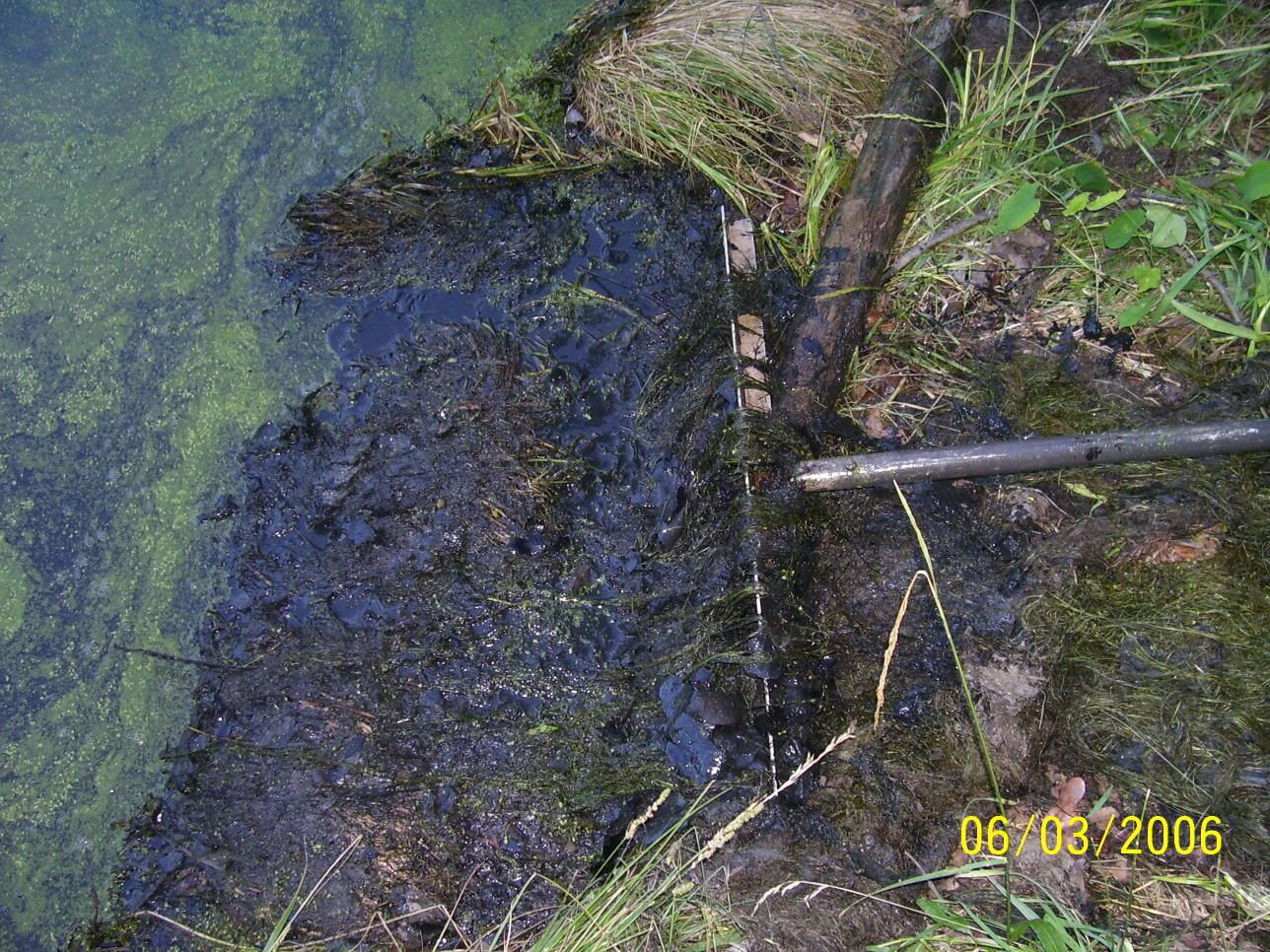 The black muck This is before I treated with Sonar 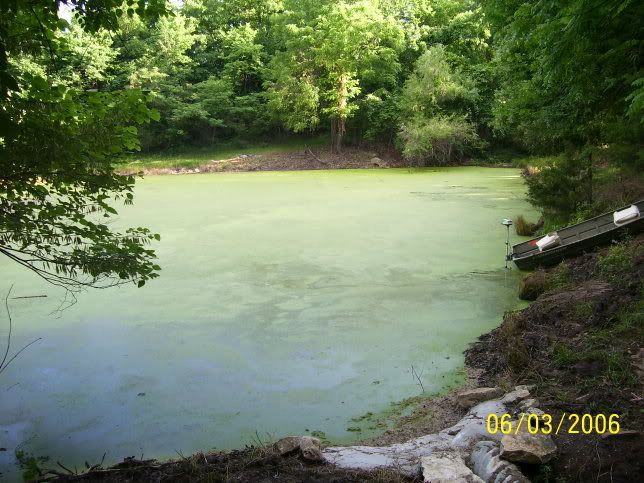 aerator swell barely making a opening in the surface 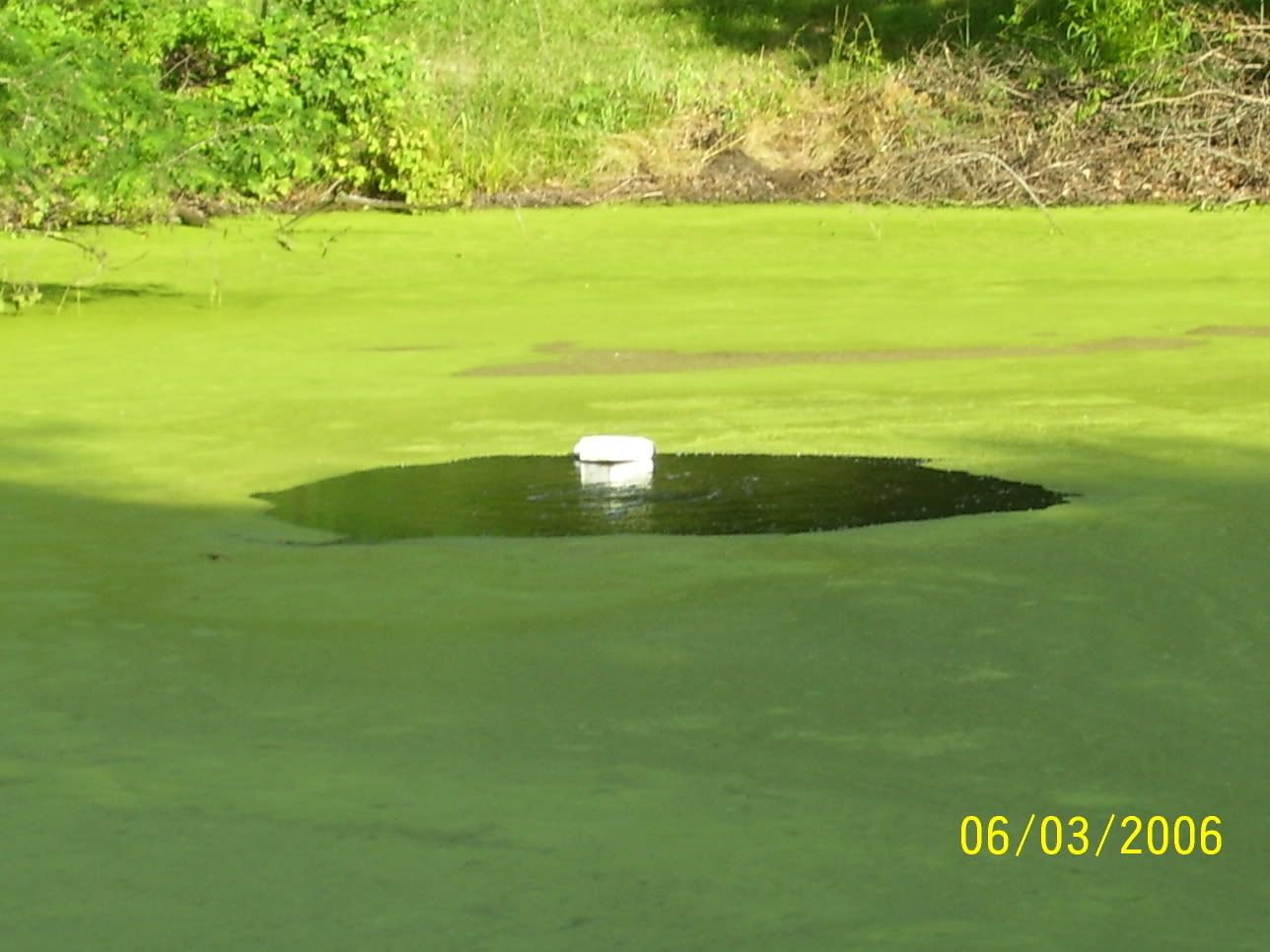 month and a half later signs of the WM and DW are thinning 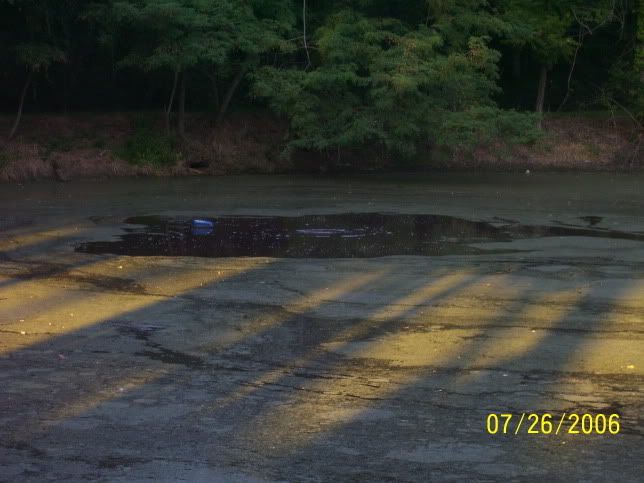 something like 60 days later and to date I haven't had a problem with WM or DW and little FA problems. I will spray a little cutrine plus will a slime develops on the surface
A little snow, Please! 
|
|
|
|
|
Joined: May 2006
Posts: 794
Lunker
|

Lunker
Joined: May 2006
Posts: 794 |
after it all cleared 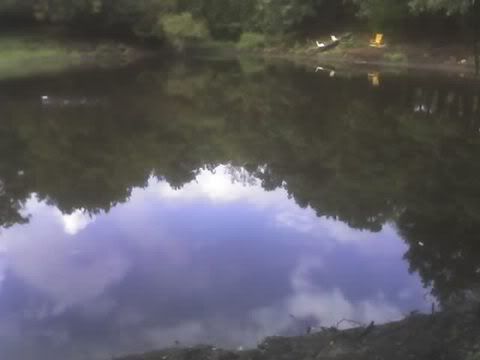
A little snow, Please! 
|
|
|
|
|
Joined: Jul 2008
Posts: 172
Lunker
|
OP

Lunker
Joined: Jul 2008
Posts: 172 |
At least what I've observed in my pond, aeration would be good for oxygen transfer in a high density fish population and preventing problems associated with fall turnover. In my opinion, the rest of the claims seen on advertisements are selling points with no validity.
|
|
|
|
|
Joined: Aug 2002
Posts: 20,043 Likes: 1
Hall of Fame  Lunker
|

Hall of Fame  Lunker
Joined: Aug 2002
Posts: 20,043 Likes: 1 |
My personal opinion on aeration reducing a muck layer is that it may not reduce it, but it will slow down the process that will make it thicker. Aerobic decomposition is always better than anerobic.
As far as adding bacteria I believe it's a waste of money. I too have yet to see an good studies that prove it is beneficial. There is bacteria already there. You just need to give it optimum conditions to multiply.
You also need to treat macrophytes and algae that are out of control to allow aeration and the bacteria that is there to do an optimum job. Otherwise they are just adding nutrients in a continuous cycle. I also have to wonder how many nutrients are being added on the lawns of the subdivision. I see some perfect golf club yards on local lakes and I know it's not natural.
Last edited by Cecil Baird1; 08/02/09 10:32 PM.
If pigs could fly bacon would be harder to come by and there would be a lot of damaged trees.
|
|
|
|
|
Joined: May 2006
Posts: 794
Lunker
|

Lunker
Joined: May 2006
Posts: 794 |
Could be, but my pond location is in a low spot surrounded by hills and trees so I don't benefit from the ripple effect of wind moving across the surface to agitate the water. If your pond bottom has a lot of organic matter and no oxygen then the right bacteria required to eat the muck from the bottom will not be present. I really couldn't say for sure that the bacteria that I added was the only factor in eliminating the muck. I believe that the combination of getting rid of the surface obstruction WM and DW along with aeration which circulates the useless water from the bottom to the surface and back into the water column gets the bacteria on the bottom the elements needed to remove the muck on the bottom. Your right, for 100 years ponds haven't needed aeration to survive and my pond probably didn't need it when it was new some 40 years ago but old age has set in and it needs a pick me up. I am sure that I have left out important details and I am only relaying to you what I have noticed in restoring my pond, and am sure that more educated and wise members will be along to help out. I will say that I was very impatient at first and wanted immediate results but luckily I was distracted with other project that needed my attention and was happy to see that things were working out for me 3 years later with the pond.
A little snow, Please! 
|
|
|
|
|
Joined: Oct 2007
Posts: 644
Ambassador Field Correspondent  Lunker
|

Ambassador Field Correspondent  Lunker
Joined: Oct 2007
Posts: 644 |
Hang in there SK63. You've got a TON of nutrients in that pond. It's going to take a while for things to change for the better.
12 ac pond in NW Missouri. 28' max depth at full pool. Fish Present: LMB, BG, RES, YP, CC, WB, HSB, WE, BCP, WCP, GSH.
|
|
|
|
|
Joined: May 2002
Posts: 1,655 Likes: 1
Ambassador Hall of Fame 2014  Lunker
|

Ambassador Hall of Fame 2014  Lunker
Joined: May 2002
Posts: 1,655 Likes: 1 |
Duck Weed is also killed by Diquat.
Bing
"I love living. I have some problems with my life, but living is the best thing they've come up with so far." � Neil Simon,
|
|
|
|
|
Joined: Nov 2007
Posts: 227
Lunker
|

Lunker
Joined: Nov 2007
Posts: 227 |
SK, as weissguy said, be patient. I am a little surprised that you haven't seen even a general improvement over a year but every pond is different. The chemistry of the pond water has a huge effect on you ability to treat it with aeration, bacteria or anything else for that matter. For instance, if your pH is greater than 8.5, you're going to have a hard time controlling algae with anything but algaecides. Bacteria have specific requirements if they are to thrive including pH, water temp., and sources of nutrients, carbon, and trace elements to name a few.
Do the homes in your watershed have any stake in the pond? If so you might consider purchasing and distributing copies of the newsletter titled "Your Lake and You" which I believe is available in the PondBoss store on this website. It basically talks about urban watershed management as a tool for keeping your lake healthy. Watershed management sounds like it is going to play a big part in achieving your goals. I hand these out to our HOA customers all the time and they love'em.
In response to documentation on the efficacy of bacterial supplements in water treament...it is well documented and has been in use at least since 1914 when the Activated Sludge process of wastewater treatment was invented. Since the 1940's nearly every large scale municipal wastewater treatment system in the developed world uses this system of "bacterial seeding" to treat waste. There is also the Aerated Facultative Lagoon process which may or may not incorporate the injection of "new" bacteria into the waste stream rather than recycled sludge. These systems can be virtually sludgeless for 20 - 30 years.
There are some differences in the application. Wastewater is a flow through system that constantly recieves large amounts of waste whereas a pond or lake is sequestered and typically receives waste relatively slowly. But the flow through process can be replicated in your pond by way of occasionally stirring your muck in order to expose burried organic wastes so that they can be oxidized. WARNING: this will stink and could potentially cause other temporary water quality issues including a drop in DO! We usually do a combination of stirring and bacterial injection but I think that one of the forum members (Bill Cody?) did an experiment where he continually stirred sediments in one jar (no bacteria) and poured bacteria in another jar without stirring and found that the stirred jar without bacterial supplements consumed more sediment than that with bacteria and no stirring. I have never tried to stir a pond without injecting bacteria so I can't really comment on whether that works or not. What I can tell you is that we typically see 1" of organic sludge removal per week when water temps are above 50 F, DO at 3 PPM or higher and pH between 6.5 - 8.5. I have also seen drastic improvements in water clarity with bacteria. We have documentation but I don't think that I can share without breaking at least a few rules of the forum.
Sorry to ramble, I just love those little critters.
|
|
|
|
|
Joined: Nov 2004
Posts: 551
Ambassador <br /> Field Correspondent Lunker
|

Ambassador <br /> Field Correspondent Lunker
Joined: Nov 2004
Posts: 551 |
Awsome post WaterWizard...While reading from the top of this topic I was formulating my response until I read yours. You said everything I wanted to say.
Keep in mind though that unchecked and left alone, a pond's whole goal in life is to become a grassy meadow. It will continue to fill with muck due to anoxic conditions on the bottom and eventually be shallow enough that terrestrial plants will begin to grow.
We as pond people are trying to slow down and even as WaterWizard has posted, reverse this process so we can have a clean healthy pond.
Your pond is like someone smoking for 40 years. The lungs are not going to clear over one year. This will be a multi year project.
I would suggest making a "Sluge Judge" by purchasing some acrylic 3/4" pipe. To connect sections, use a pvc coupler. At the top add a 3/4" ball check valve. Graduate the bottom pipe using a tape measure.
Push the pipe down into the muck and pull up. The check valve will hold the water and the ooze along with the more solid muck.
This will allow you to measure the muck reduction as you are adding bacteria.
A cheap xray if you may.
Keep us posted.
|
|
|
|
|
Joined: May 2006
Posts: 794
Lunker
|

Lunker
Joined: May 2006
Posts: 794 |
Cool! I wish I had made one of those when I first started my pond restore. I had a visual aid but it involved a yellow lab, well half yellow half black! I can atleast get one going now though. Thanks for the tip.
A little snow, Please! 
|
|
|
|
|
Joined: Aug 2002
Posts: 20,043 Likes: 1
Hall of Fame  Lunker
|

Hall of Fame  Lunker
Joined: Aug 2002
Posts: 20,043 Likes: 1 |
In response to documentation on the efficacy of bacterial supplements in water treament...it is well documented and has been in use at least since 1914 when the Activated Sludge process of wastewater treatment was invented. Since the 1940's nearly every large scale municipal wastewater treatment system in the developed world uses this system of "bacterial seeding" to treat waste. There is also the Aerated Facultative Lagoon process which may or may not incorporate the injection of "new" bacteria into the waste stream rather than recycled sludge. These systems can be virtually sludgeless for 20 - 30 years. With all due respect Water Wizard (and I mean that as you probably know a lot more on this subject than I do) sewage treatment plants are not ponds. You could argue they are extreme examples of sludge in a pond, but I see lots of differences. I see a lot more going on in sewage treatment plant than just adding bacteria and aeration. To me this is like comparing apples to oranges. I've also seen some "natural" lagoons for sewage treatment fail miserably, most notably in my area. I still have yet to see any good hard data on the benefits of bacteria in a pond. Lots of claims but no scientific data to sink my teeth in. If it is so effective and proven there should be a plethora of data out there.
Last edited by Bill Cody; 08/16/09 09:34 PM. Reason: spelling fix
If pigs could fly bacon would be harder to come by and there would be a lot of damaged trees.
|
|
|
|
|
Joined: Apr 2002
Posts: 15,141 Likes: 488
Moderator
Ambassador
Field Correspondent Lunker
|

Moderator
Ambassador
Field Correspondent Lunker
Joined: Apr 2002
Posts: 15,141 Likes: 488 |
Bacterial additions can have benefits to ponds but sometimes those benefits are not real noticable. The amount or degree of benefit depends of the pre-existing conditions of the pond. As Cecil mentioned, not a lot of published peer reviewed scientific studies have been done on the benefits of adding bacterial, microbial and enzyme formulations to ponds. Sewage waste lagoons are not typical ponds and have a lot of differences from ponds. Even the sewage people and bacteria supply usually don't consider their lagoons true ponds.
Last edited by Bill Cody; 08/16/09 09:33 PM.
aka Pond Doctor & Dr. Perca Read Pond Boss Magazine -
America's Journal of Pond Management
|
|
|
|
|
Joined: Nov 2007
Posts: 227
Lunker
|

Lunker
Joined: Nov 2007
Posts: 227 |
Of course there are differences between wastewater and ponds. I tried to point out the major one being flow dynamics. There are also obvious differences between a pond vs. sludge and water in a jar. But I think there is something to be learned from both as the biochemical process' responsible for digesting the sludge are essentially the same in all three scenarios.
There are plenty of aerated facultative lagoons that stock fish in the final treatment cell. The purpose of the fish is to eat the bacteria and invertebrates that have fed on the bacteria therefore converting the wastes into fishy biomass. In this way and others, wastewater treatment can be similar to a pond. The fish are then harvested for several different uses.
I tried to find documentation online and you are all correct, there is not much out there aside from information on wastewater. I actually went 10 pages deep on a couple of google searches and found nothing on ponds. Perhaps this is because the stakes are a lot higher in a wastewater treatment plant than a private "recreational" pond. What would drive a peer reviewed paper on a topic that impacts so few people? Just a thought...
Anyone out there looking for a masters thesis topic?
BC, was it you who did that jar test?
|
|
|
|
|
Joined: Jan 2008
Posts: 8,795 Likes: 68
Chairman, Pond Boss Legacy award; Moderator; field correspondent Lunker
|

Chairman, Pond Boss Legacy award; Moderator; field correspondent Lunker
Joined: Jan 2008
Posts: 8,795 Likes: 68 |
"Keep in mind though that unchecked and left alone, a pond's whole goal in life is to become a grassy meadow."
This just crystalized for me in an instant the fact we are all making efforts to reverse or reengineer nature with pond management...thus various issues are bound to arise considering the nature of the work we're doing. Cary, this was a very illuminating point I personally consistently forget in my frustrations trying to tame or redirect the natural processes of maturation of my ponds.
I have yet to hear of an unsatisfied aerator customer on the forum until today. I always considered it a magic arrow for issues stated above. This gives me moment to pause...I'm about to throw $6k at a Vertex Air 7 and perhaps I need to rethink things....
Many men go fishing all of their lives without knowing that it is not fish they are after. ~ Henry David Thoreau ![[Linked Image from i1261.photobucket.com]](http://i1261.photobucket.com/albums/ii582/teehjaeh57/I_subscribe_zps69249d43.gif)
|
|
|
|
|
Joined: Jun 2007
Posts: 7,099 Likes: 23
Ambassador Field Correspondent Hall of Fame  Lunker
|

Ambassador Field Correspondent Hall of Fame  Lunker
Joined: Jun 2007
Posts: 7,099 Likes: 23 |
Due to reasons most know, My pond has been left unattended for the last 8 months. My watershed is entirely hardwood forest with all oak and hickory. I get MANY tons of leaves in my pond and until this year, the aeration system had been run 24/7 till last November with ZERO muck buil-up from 5+ years of decaying leaves. I didn't want to leave the aeration on unattended and when I saw my pong in mid-July there were 6 inches of leaves rotting in the shallows and few YOY to be found. With aeration, I never had anything other than fresh leaf debris in the shallows.
Two years ago we had some work done on the dam and other parts. The builder said it would need to dry at least 6 weeks before he could get into the bottom areas----due to aeration keeping the muck to nil, he was working 3 days after draining.
|
|
|
|
|
Joined: Jan 2009
Posts: 10,458 Likes: 2
Ambassador
Field Correspondent
Hall of Fame Lunker
|

Ambassador
Field Correspondent
Hall of Fame Lunker
Joined: Jan 2009
Posts: 10,458 Likes: 2 |
Some of the neatest ecosystems are natural ponds that have slowly filled in over time. Bogs and mashes have some of the most unique and diverse plant life around. However, not many forum members want to spend thousands of dollars to have their pond turn into a bog.
|
|
|
|
|
Joined: Nov 2004
Posts: 551
Ambassador <br /> Field Correspondent Lunker
|

Ambassador <br /> Field Correspondent Lunker
Joined: Nov 2004
Posts: 551 |
Rainman, great post. Its so hard to describe an intangeble concept like this unless you actually drain the pond to see the results.
Teehjaeh57, aeration will help, not hender regardless of your goals and regardless of the product you are using. All I suggest is that you make sure it is sized properly to meet your goals.
|
|
|
|
|
Joined: Jan 2008
Posts: 8,795 Likes: 68
Chairman, Pond Boss Legacy award; Moderator; field correspondent Lunker
|

Chairman, Pond Boss Legacy award; Moderator; field correspondent Lunker
Joined: Jan 2008
Posts: 8,795 Likes: 68 |
Thanks Cary/Rex/et al - I think after learning more about the scenario here I have my confidence restored - appreciate the solid examples of the benefit of aeration provided here.
Many men go fishing all of their lives without knowing that it is not fish they are after. ~ Henry David Thoreau ![[Linked Image from i1261.photobucket.com]](http://i1261.photobucket.com/albums/ii582/teehjaeh57/I_subscribe_zps69249d43.gif)
|
|
|
|
|
Joined: Aug 2002
Posts: 20,043 Likes: 1
Hall of Fame  Lunker
|

Hall of Fame  Lunker
Joined: Aug 2002
Posts: 20,043 Likes: 1 |
Just for the record i was not skeptical about the benefits of areation. I have diffusers in all my ponds. If you go back and look at my post I was commenting on all the lofty claims of adding bacteria when there is not a lot of good data to back them up. 
If pigs could fly bacon would be harder to come by and there would be a lot of damaged trees.
|
|
|
|
|
Joined: Apr 2002
Posts: 15,141 Likes: 488
Moderator
Ambassador
Field Correspondent Lunker
|

Moderator
Ambassador
Field Correspondent Lunker
Joined: Apr 2002
Posts: 15,141 Likes: 488 |
Just for the record, once you start looking there are lots of peer reviewed scientific articles about topics that interest only a few esoteric people. Actually one could say that MOST scientific articles in journals are only of interest to a select group and often that group is pretty small.
aka Pond Doctor & Dr. Perca Read Pond Boss Magazine -
America's Journal of Pond Management
|
|
|
|
|
Joined: Aug 2002
Posts: 20,043 Likes: 1
Hall of Fame  Lunker
|

Hall of Fame  Lunker
Joined: Aug 2002
Posts: 20,043 Likes: 1 |
But Bill if there is data on the benefits of adding bacteria, regardless of how esoteric, why can't those that make the lofty claims about adding the bacteria produce them? Wouldn't it make sales more likely?
If pigs could fly bacon would be harder to come by and there would be a lot of damaged trees.
|
|
|
|
|
Joined: Dec 2004
Posts: 709
Ambassador Lunker
|

Ambassador Lunker
Joined: Dec 2004
Posts: 709 |
I haven't commented on this thread as it has been well covered by some of the other experts. I do want to comment on what Bill and Cecil have brought up regarding the bacteria products on the market for ponds and lack of scientific data to support the claims made by those who sell and use them. These products are popular and there is a lot of money to be made by selling them~ I have dealers who use certain types and blends and swear by the results they achieve. I think just about every aeration manufacture has jumped on the wagon, but with out real factual data we just can't bring our company to market these products. I'm not saying they don't work ~ but how can you make recomendations with out knowing if they work? We have recently hired a PHD in limnology to conduct research that can be judged by peers, published, and presented. We hope to shine some light into this subject as well as to gain a better understanding into the effects of aeration on ponds and their dynamic ecosystems. Stay tuned...
|
|
|
|
|
Joined: Apr 2008
Posts: 94
Lunker
|

Lunker
Joined: Apr 2008
Posts: 94 |
Bacteria - sounds to me like the stuff they try to sell to put in a septic tank
All the old timers in my area say just throw a dead cat in the tank to get the bacteria started.
I'm not kidding....
|
|
|
Moderated by Bill Cody, Bruce Condello, catmandoo, Chris Steelman, Dave Davidson1, esshup, ewest, FireIsHot, Omaha, Sunil, teehjaeh57 |
|